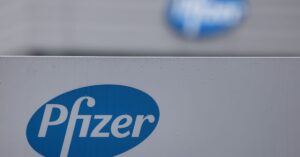On today’s episode of the 5 Things podcast: Biden rolls out COVID-19 vaccine rules for large businesses
Workers at companies around the country will soon have to make a choice – the vaccine or regular testing (possibly on their own dime). Plus, economic opportunity reporter Charisse Jones talks through the possibility of financial stability for the Native American community, Washington Watchdog Fellow Rachel Looker explains the push to increase Pell grants, the Justice Department has filed new legal action against Texas and it’s new movie Friday in theaters.
Podcasts:True crime, in-depth interviews and more USA TODAY podcasts right here.
Hit play on the player above to hear the podcast and follow along with the transcript below. This transcript was automatically generated, and then edited for clarity in its current form. There may be some differences between the audio and the text.
Taylor Wilson:
Good morning. I’m Taylor Wilson, and this is 5 Things you need to know Friday, the 5th of November 2021. Today, new rules on requiring COVID-19 vaccines for workers around the country, lots of conversation around increasing Pell Grants to pay for college, and more.
Here are some of the top headlines.
- Western Australia is continuing tight COVID-19 restrictions into next year. The state wants a 90% vaccination rate before border restrictions are lifted.
- Two Iowa high school students have been charged with first degree murder in the death of Spanish teacher, Nohema Graber, who taught at their school. The 16 year olds have been charged as adults.
- And a funeral will be held today for former Secretary of State Colin Powell. The service at Washington National Cathedral comes after Powell died last month from COVID-19. He was 84.
New federal rules were announced yesterday, requiring workers at larger companies to get vaccinated against COVID-19 by January 4th or face regular testing. Workers who choose the testing option may have to take on the cost themselves and they’ll be required to wear a face mask on the job beginning December 5th. The rules apply to businesses with a hundred or more employees, but the Labor Department is taking feedback over the next month on whether smaller workplaces should also be included. The requirement also applies to state and local government workers in 26 states, including teachers and school staff. George Washington University Public Health Professor David Michaels said the requirements and this week’s announcement will bring immediate effects.
David Michaels:
This regulation is structured, so it strongly encourages vaccination. It’s much easier for employers if they just mandate vaccinations. And they put a lot of burden on employees to have to purchase their own testing and masks if the employer doesn’t want to do it. I think that’s an unfortunate choice. I think employers should be providing those things, but the way it’s structured is going to move people into vaccinations very quickly. There certainly will be some industries that decide to wait and they can wait on the testing program till after the first of the year. But the vaccination program has to start immediately. And I think we’re going to see some immediate effects and they’ll be very possible.
Taylor Wilson:
But some advocates for both employers and employees are worried the rules could lead to an even deeper labor shortage. Stephanie Martz from the National Retail Federation.
Stephanie Martz:
We are suffering under real workforce shortages. We are suffering under supply chain issues, some of which are in turn due to workforce shortages. And so I’m really concerned about what’s going to happen if employees in even marginal percentages decide that they would rather not work than be subject to mandates like this one. That doesn’t at all reflect our industry’s view of vaccines in general, it’s just reflecting the reality of where we are right now in terms of trying to get employees to come to work every day and help get us through the holiday season.
Taylor Wilson:
Businesses can be tougher than the rules and require that workers get vaccinated instead of even giving them the option of regular testing. And while the federal government is giving companies the option of requiring unvaccinated workers to pay for the tests themselves, companies may eventually be forced to pay for them because of other laws or collective bargaining agreements. Employers must provide paid time off for their employees to get vaccinated and to recover from many side effects that keep them from working.
Native Americans saw their jobless rates soar during the pandemic, but a new report shows that the community could soon be gaining political clout and some financial stability. Economic Opportunity Reporter Charisse Jones has more.
Charisse Jones:
So Wells Fargo really offered us a snapshot into indigenous America and some of the hopeful signs that are on the horizon at this point. So the Native American population is really growing at a faster clip than the broader population. We’re seeing an acceleration of new businesses that are going beyond casinos, which have been kind of the economic lifeline of a lot of these communities. And we’re seeing more federal resources going towards indigenous communities. All of that together are harbingers of something really positive and the potential for that community’s political power to increase and for them to be able to focus more attention and resources on those communities. So, it could be a way to really give them an economic boost.
Part of it is that you have a lot more Americans who are claiming native ancestry. So those who say that they’re indigenous, that grew by about 27% to 3.7 million people, but then you have another six million people who are now saying that they’ve got Native Alaskan or Native American ancestry in their families. And so for whatever reason, people are claiming this ancestry more and, again, when you’ve got bigger numbers, that means you can have a bigger voice. So it’s something that could bring them a lot more political clout and power. But that’s basically what’s going on. They also tend to be a younger population. The median age of Native Americans is 32 as compared to 38 for the broader population. So they’ve also got a lot of young people coming up, and that can also be really helpful.
Taylor Wilson:
You can read Charisse’s full story by searching Native American Stability on usatoday.com. You can also click the link in today’s episode description.
President Joe Biden wants to increase Pell Grants. The aid is designed to help low income students pay for college. And the current maximum amount is just under $6,500 a year. Biden wants to bump that up by $550, but experts say even that just isn’t enough. USA Today Washington Watchdog Fellow Rachel Looker explores.
Rachel Looker:
President Biden wants to increase the Pell Grants really just to keep up with the rising costs of college and help specifically low income students who are seeking a certificate or a two or four-year degree. Nearly seven million students depend on the Pell Grants. And according to the White House, the maximum grant went from covering nearly 80% of the cost of a four-year college down to under 30% of covering the cost for a four-year college degree. So this has led to increased amounts of debt for students and Biden has requested increases to benefit, it’s about 58% of black students who receive the Pell Grant. And he has said that this is serving as his down payment to double the maximum award, which many higher education institutions and other organizations are really advocating for.
So experts are saying that 550 isn’t enough to raise the Pell Grant. They have similar thoughts saying that doubling the Pell is what is really needed to keep up with the rising cost of college. One nonprofit group, the Gender Equity and Policy Institute found that doubling the Pell would cut student debt by more than half. So this group says that increasing the Pell Grant helps stimulate economic growth, it helps ensure there’s a trained workforce, and it just overall provides more opportunities for individuals to pursue higher education. An analysis from the same group also found that doubling the Pell will specifically help minority populations like students of color and women. There’s also been a few other higher education institution presidents that have shown support to double the Pell Grant. They’ve sent letters to their congressional delegations, but really it’s just because the cost of education has significantly increased compared to how much the Pell Grant actually covers.
Taylor Wilson:
You can follow along with Rachel’s work on Twitter @_RachelLooker.
The Justice Department has filed new legal action against the State of Texas. It challenges a law there that puts voting restrictions on balloting by mail and aid given to disabled voters in polling locations. The federal lawsuit argues that the law violates the Voting Rights Act by improperly restricting voters with translation needs and visual impairments from seeking help to cast their ballots. The department also took aim at a separate provision that would allow for the rejection of mail-in ballots for errors or emissions, unrelated to the voter’s eligibility status. Texas Governor Greg Abbott has described the voting law as strengthening election integrity. And he’s also rejected claims by civil rights advocates and Democratic opponents, that it would restrict access to voters of color. In addition to the Justice Department challenge, the law also faces other legal challenges brought by civil rights advocates. The new legal action comes as the Justice Department is already pushing a challenge in the Supreme Court to the Texas law that effectively bans abortions after six weeks, one of the most restrictive laws of its kind in the country.
Eternals is here.
Salma Hayek as Ajak in Eternals:
Five years ago, Thanos erased half of the population of the universe, but the people of this planet brought everyone back with a snap of a finger. The sudden return of the population provided the necessary energy for The Emergence to begin.
Taylor Wilson:
Marvel’s latest superhero film hits theaters today. It’s directed by Chloe Zhao who won Best Director and Best Picture for last year’s Nomadland. Eternals also has a star-studded cast with Selma Hayek, Kumail Nanjiani, Angelina Jolie, Richard Madden, and others. The plot avoids the usual Marvel cinematic-connected storylines, and instead focuses on a new band of immortal beings sent to earth to protect humans from alien monsters. But some critics have not been on board so far. Our own movie critic, Brian Truitt called it “an impressively ambitious and often beautiful film,” but he also wrote that the movie’s “exceedingly earnest narrative struggles to juggle its many subplots and tries to do too much.” The movie has a 51% critics rating on Rotten Tomatoes, though, the early audience score is much higher at 86%.
Also out in theaters today, Spencer.
Kristen Stewart as Princess Diana in Spencer:
Well, here, in this house, there is no future. Past and the present are the same thing.
Taylor Wilson:
The film stars Kristen Stewart as Princess Diana. It’s so far gotten the reverse of Eternals on Rotten Tomatoes with critics loving it and the audience less so. For more from the world of movies, head to the Entertainment Section on usatoday.com.
And as always, you can find 5 Things wherever you’re listening right now, seven mornings a week. Thanks as always to PJ Elliot for his great work on the show. And I’m back tomorrow with more of 5 Things from USA Today.



















